The Annual B2B Content Marketing Report is produced by Content Marketing Institute and MarketingProfs, with support from ON24.
The 12th edition provide insights into Business to Business (B2B) content marketing benchmarks, budgets, strategies and trends in the past 12 month and what to expect in 2022. CMI asked respondents :
“What did the pandemic change most about your organization’s content marketing strategy/approach?”
The Pandemic woke a sleeping giant
The pandemic awoke a sleeping giant – content marketing, that is. Without in-person events and face-to-face selling, many who had previously paid little attention to content marketing suddenly became aware of its power. More content marketers got a seat at the table and helped keep many businesses on their audiences’ radar. Some discovered new audiences altogether.
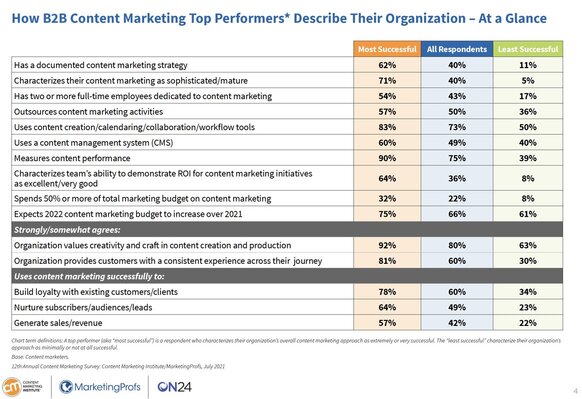
77% reported that their organization has a content marketing strategy. Of those, 58% said their strategy is moderately or slightly different now versus pre-pandemic.
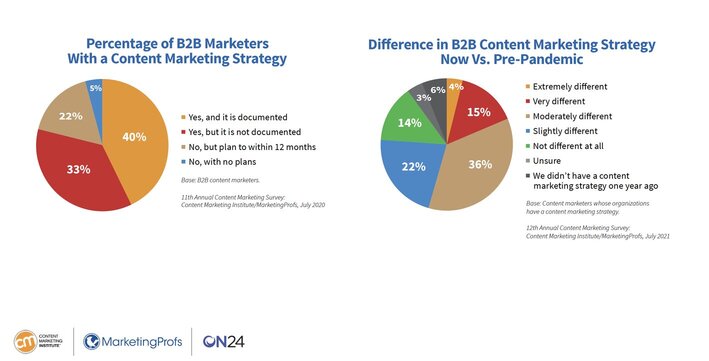
The organization’s size had little impact on overall success.
29% of respondents said their organization was extremely or very successful with content marketing in the last 12 months. The top contributing factor was the value their content provides. The organization’s size had little impact on overall success. For example, 27% of those from small companies reported high levels of success, as did 30% of those from large companies.
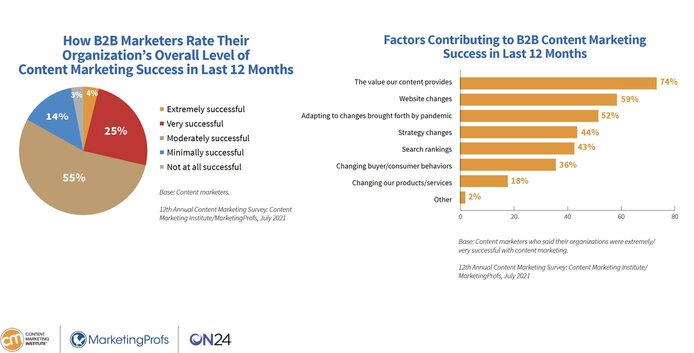
Increased Outsourcing
29% of respondents said their organization was extremely or very successful with content marketing in the last 12 months. The top contributing factor was the value their content provides. The organization’s size had little impact on overall success. For example, 27% of those from small companies reported high levels of success, as did 30% of those from large companies
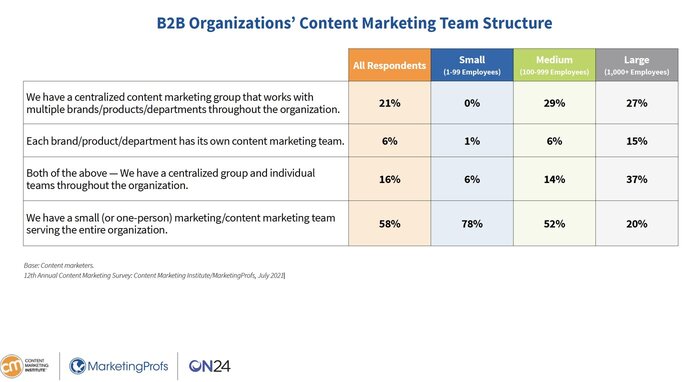
Half of all respondents said their organization outsources at least one content marketing activity, with large companies being the most likely to outsource. Two years ago, 71% of respondents from large companies said they outsourced, compared with 61% the previous year. The figure is back up again, and even higher than two years ago (75% vs. 71%).
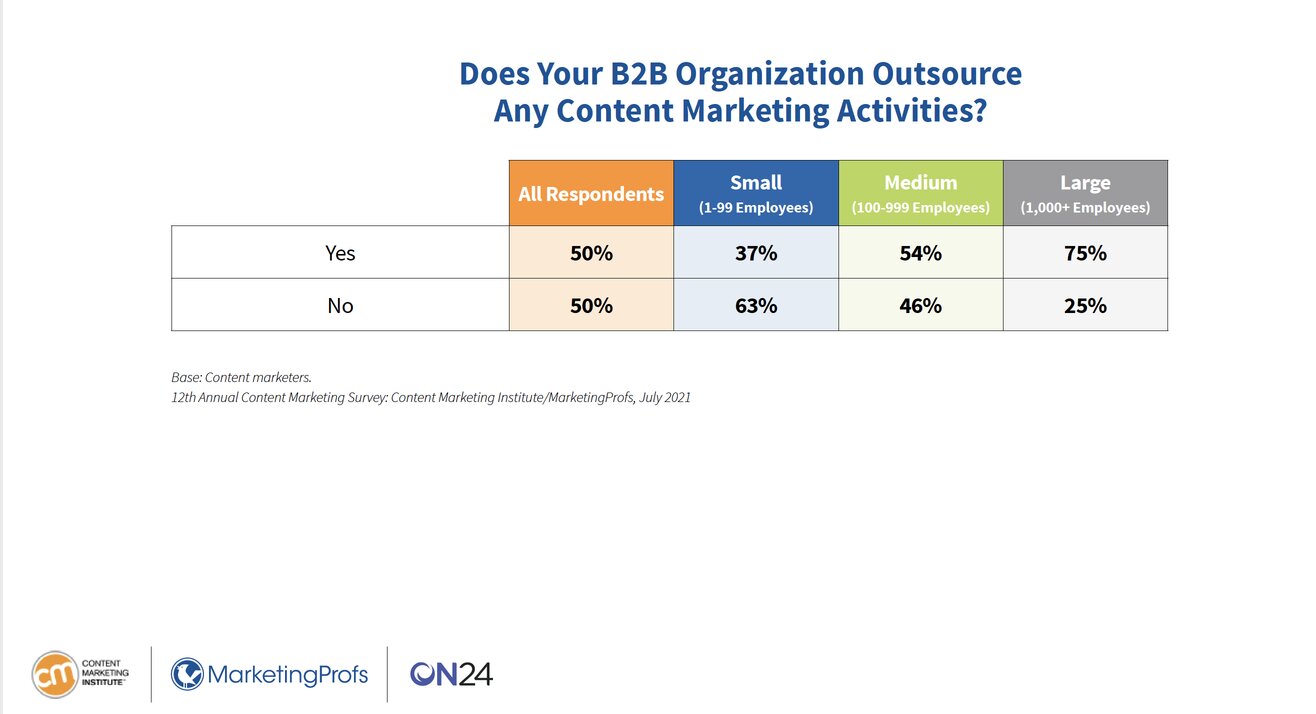
Top Technologies B2B Organizations Use to Assist With Content Marketing
The top technologies B2B organizations use to assist with content marketing are analytics tools (83%), social media publishing/analytics (80%), email marketing software (75%), and content creation/calendaring/collaboration/ workflow tools (73%).
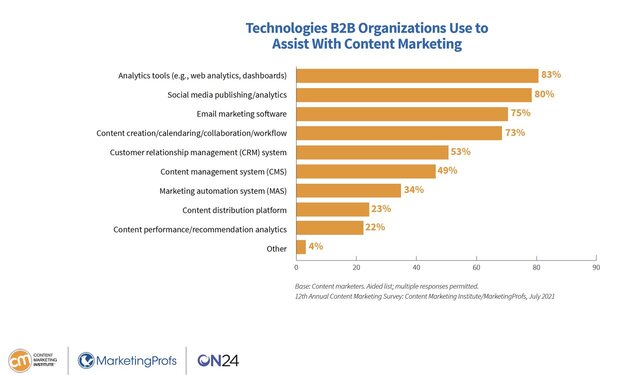
Content Assets B2B Marketers Created/Used in Last 12 Months
90% of respondents used short articles/posts for content marketing purposes in the last 12 months. The most successful content marketers were more likely than all respondents to have used:
- Case studies …………………………………………….73% vs. 61%
- E-books/white papers ………………………………67% vs. 56%
- Long articles/posts …………………………………..62% vs. 49%
- Research reports………………………………………40% vs. 29%
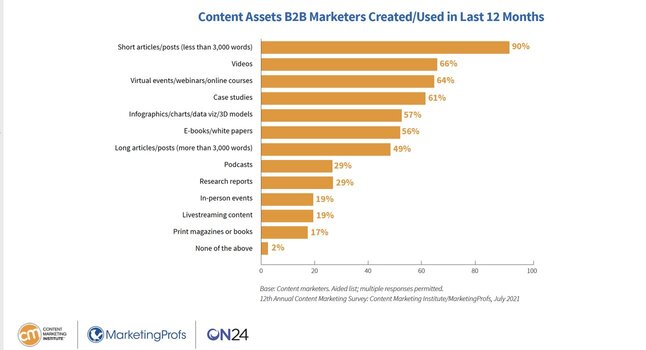
B2B Content Assets That Produced the Best Results in Last 12 Months
Respondents said virtual events/webinars/online courses produced the best results for their content marketing in the last 12 months (58%) — those who are most successful agreed (66%). Long articles/posts stood out as an area where those who are most successful reported better results than respondents overall (43% vs. 32%).
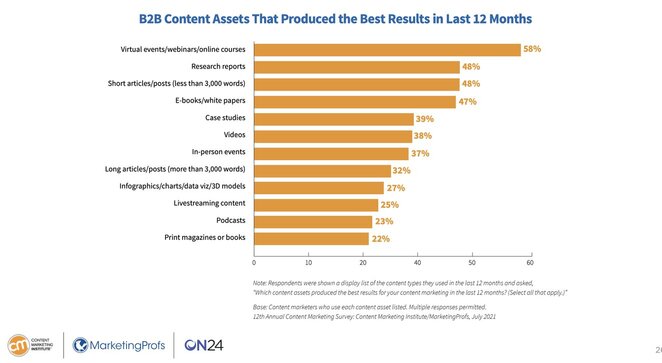
LinkedIn is the organic social media platform
LinkedIn is the organic social media platform that B2B content marketers used the most and the one they said produced the best results.
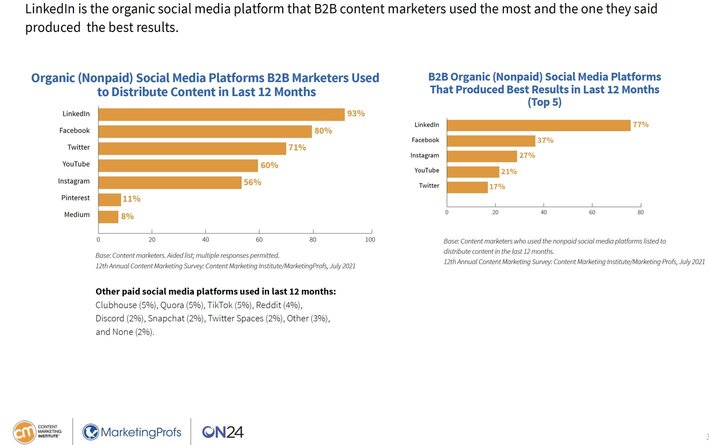
Among the 77% of respondents who used paid social media platforms, the majority chose LinkedIn (75%) and Facebook (69%), which they also said produced the best results.
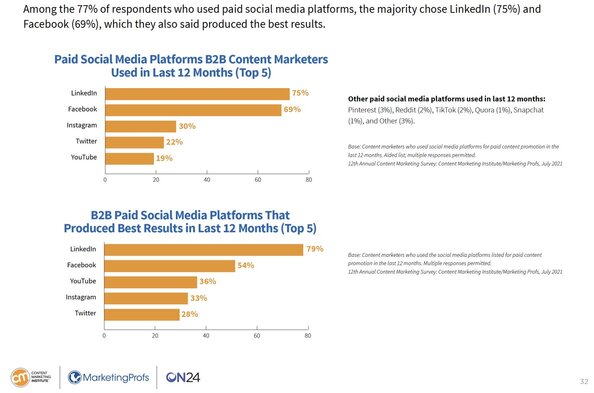
Website engagement provided the most insight into performance
75% of respondents said their organization measures content performance. Among those, 69% said website engagement provided the most insight into performance.
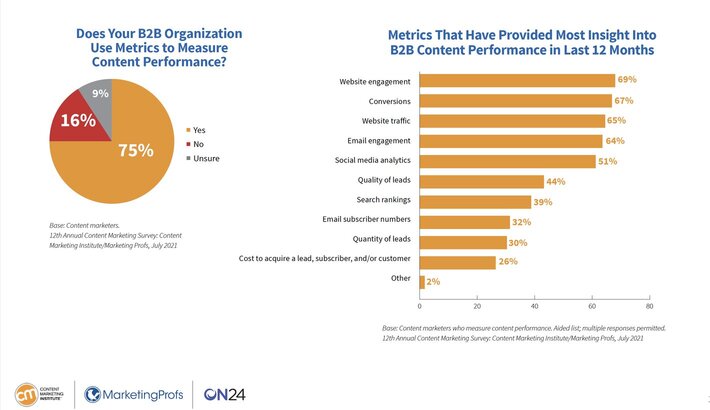
B2B marketers say the top three goals content marketing helps them achieve are creating brand awareness, building credibility/trust, and educating the audience.
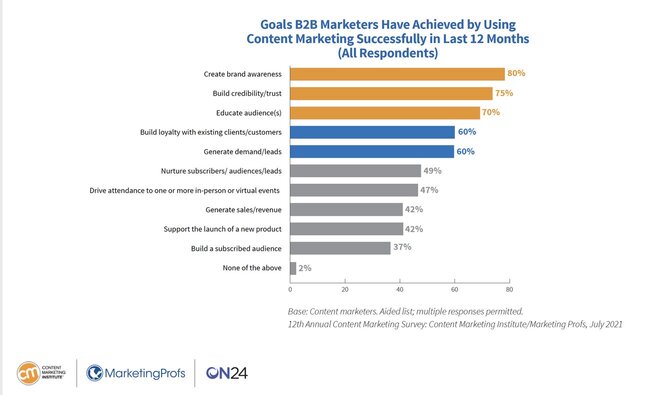
Most respondents were successful with using content marketing to create brand awareness. However, a much higher percentage of the most successful said they met the following goals in the last 12 months:
- Build loyalty with existing clients and customers (78% vs. 60%)
- Nurture subscribers/audiences/leads (64% vs. 49%)
- Generate sales/revenue (57% vs. 42%)
- Build credibility and trust (88% vs. 75%)
- Build a subscribed audience (50% vs. 37%)
- Drive attendance to one or more in-person or virtual events (60% vs. 47%)
- Generate demand/leads (72% vs. 60%)
Content marketing areas of importance in 2021/2022 The top four content marketing-related areas that marketers said would be most important to their organizations in 2021 and 2022 were:
- Changes to SEO/search algorithms (62%)
- Data management/analytics (50%)
- Content marketing as a revenue center (44%)
- Changes to social media algorithms (42%)
B2B Organizations’ Current Content Marketing Challenges
Respondents said their top two content marketing challenges were creating content that appeals to multi-level roles and accessing subject matter experts to create content:
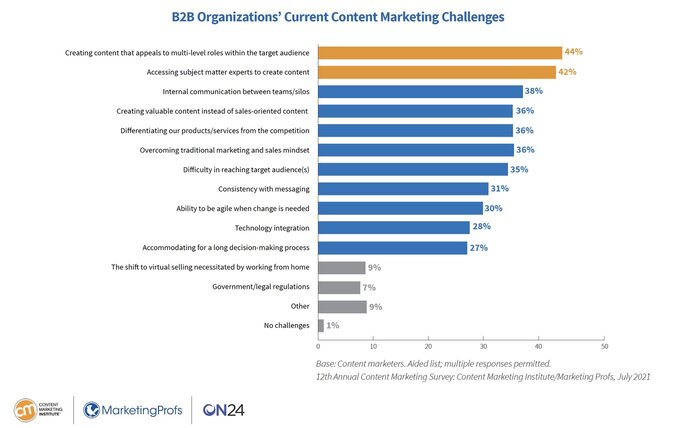
Content Marketing-Related Areas That Will Be Most Important to B2B Organizations in 2021/2022
Changes to SEO/search algorithms (62%) and data management/analytics (50%) are top-of-mind for B2B content marketers in 2021/2022.
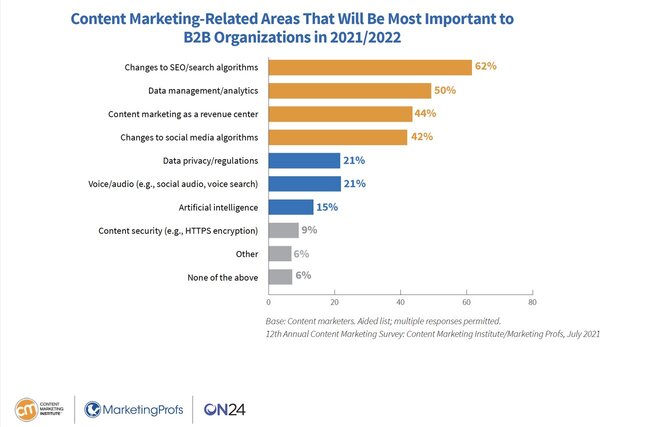
Areas of B2B Content Marketing Investment in 2022
More than half of all respondents predicted 2022 investment in video, events, owned-media assets, and paid media
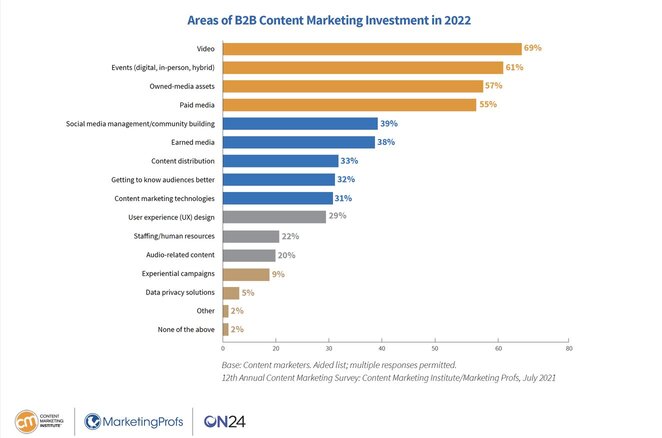
A strategic content marketing operation isn’t the storyteller of the business. It enables everyone else to be the storytellers.
Need help with developing a digital strategy for your business? Get in touch.
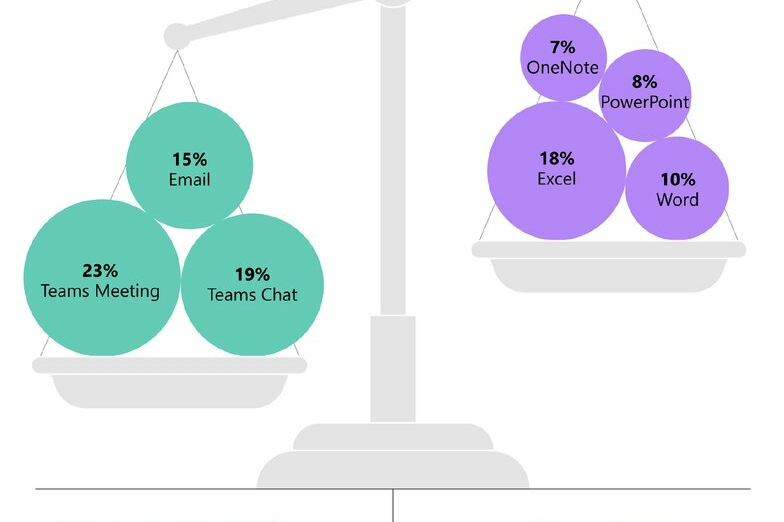


[…] 12th Annual B2B Content Marketing: Benchmarks, Budgets and Trends Insights for 2022 […]